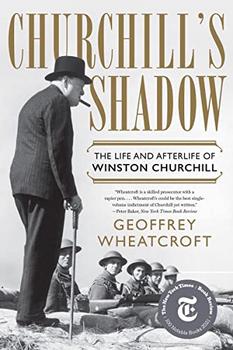Summary | Excerpt | Reviews | Beyond the Book | Readalikes | Genres & Themes | Author Bio

The Life and Afterlife of Winston Churchill
by Geoffrey Wheatcroft
As far as possible I've tried to write as what Keynes called 'the historian of Opinion', seeing Churchill through the eyes of his contemporaries, and keeping in mind F.W. Maitland's rule: 'It is hard to think away out of our minds a history which has long lain in a remote past but which once lay in the future.' Events must be understood according not to how they turned out, but to how men at the time expected them to turn out: a principle which applies to Churchill's career more than most. And while I haven't tried to imitate the fashionable cinematic technique of non-linear narrative, since I'm not constrained by a month-by-month, year-by-year account, I've sometimes taken episodes out of sequence with flashbacks, and my lens has sometimes panned round a wider field, or zoomed in for close-ups of critical moments.
This has allowed me to dwell on certain passages or controversies in Churchill's career which have a particular resonance to this day: his imperial and racial attitudes; his belief in 'the English-speaking races' (later 'peoples') and their supposed unity, particularly in the form of an Anglo-American 'special relationship'; his strategical ambitions, obsessions and follies; his dealings with Ireland; his support for Zionism; his confused and conflicted attitude towards the bombing of cities and civilians; his complicated engagement with European integration and with what part, if any, the British should play in it; and, far from least, the legacy to this day of what he so dubiously called his 'wilderness years' and his critique of appeasement and the Munich agreement.
Part of the problem may be the sheer vastness of Churchill's life. He was born less than ten years after an American Civil War which would endlessly fascinate him, fought in a country he would visit for the first of many times at the age of twenty, and which would play a large part in his life, long before he was adopted there as a national hero and made an honorary citizen, in a ceremony which took place almost exactly on the centenary of Gettysburg. Or again, he was born four years after the Franco-Prussian war, whose sequel would dominate much of his life; he played a leading part in two more wars between Germany and France, but lived to see that 're-creation of the European family' based on a 'partnership between France and Germany' of which he had dreamed in 1946, if not quite the 'United States of Europe' he also advocated.
He rode in a cavalry charge in 1898; he lived to control atomic bombs. He celebrated his twenty-first birthday in 1895 while witnessing a patriotic rebellion in Cuba; he approached his eighty-eighth birthday as the world was nearly plunged into nuclear war over Cuba. He was elected to Parliament in the reign of Queen Victoria; he was prime minister to greet a new young queen fifty-one years later. He was appointed a Parliamentary Under-Secretary aged thirty-two in December 1905; he resigned as prime minister aged eighty in April 1955, the longest such ministerial span in British political history. The scope of his story is still hard to grasp.
Then again, this is not a hostile account, or not by intention, nor consciously 'revisionist' or contrarian, except to the extent that any history worth reading must in some way revise what has gone before, and maybe also that I have a contrary nature. 'Alternative' might be a better word for my approach. 'The English-speaking peoples seem to have a settled view of Churchill's glory which no amount of historical debate will now alter,' his admiring biographer Andrew Roberts has confidently asserted. But do they, or should they? There was no 'settled view' of him during most of his lifetime, and controversy follows him to this day, as numerous episodes in recent years have shown.
Over the past thirty years, since the heavy hand of the official biographer was lifted from Churchill's archive, there has been a great flowering of serious Churchillian studies, which has opened many new perspectives on his life and conduct, some of them far from flattering. It's significant that the best of those books have been on specific aspects of his career: Churchill and domestic politics, Churchill and Empire, Churchill and America, Churchill and Ireland, Churchill and Zionism, Churchill as war leader, Churchill and the Bengal famine, Churchill and his war cabinet, Churchill and the writing of The Second World War, Churchill as rhetorician, Churchill as writer, Churchill and Lloyd George, Churchill and Attlee, Churchill and Roosevelt, Churchill and Orwell, Churchill and his son, Churchill and his money, Churchill and his horses, Churchill and his cook. Even others have to be seen in his shadow, so that a biography of the great union leader who became a central figure in Churchill's wartime government and then a famous Foreign Secretary is called Ernest Bevin: Labour's Churchill. And yet with all those books, and even now, so long after his death, the political historian Vernon Bogdanor has said plausibly that the definitive biography of Churchill is still to seek.
Excerpted from Churchill's Shadow by Geoffrey Wheatcroft . Copyright © 2021 by Geoffrey Wheatcroft . Excerpted by permission of W.W. Norton & Company. All rights reserved. No part of this excerpt may be reproduced or reprinted without permission in writing from the publisher.
Your guide toexceptional books
BookBrowse seeks out and recommends the best in contemporary fiction and nonfiction—books that not only engage and entertain but also deepen our understanding of ourselves and the world around us.